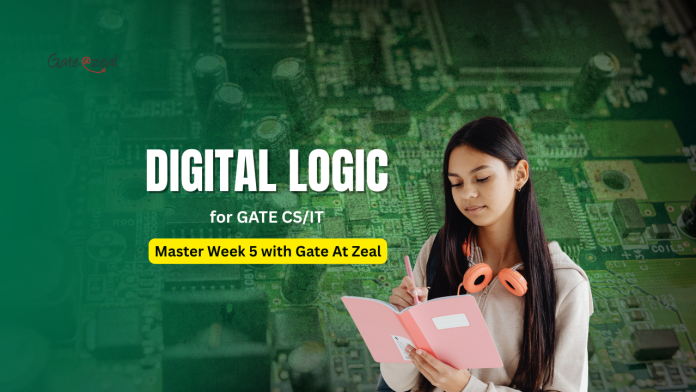Week 5 is a turning point in your GATE CS/IT preparation. It’s time to conquer one of the most scoring and conceptually rich subjects: Digital Logic for GATE CS/IT. Whether you’re studying at home or enrolled in a coaching institute like Gate At Zeal, this guide provides a week-by-week strategy to master the foundations of digital electronics—fast and effectively.
This topic doesn’t just bring marks; it strengthens your base for Computer Organization and Microprocessors, making it a double-benefit subject you simply can’t ignore.
Table of Contents
Why Digital Logic Matters in GATE CS/IT
- Weightage: Around 5–7 marks in the GATE CS/IT paper.
- Nature: Objective, concept-based, low on memorization.
- Scoring Potential: High, due to predictable and repetitive question types.
- Dependency: Useful for Computer Organization and understanding logic in programming.
At Gate At Zeal, Digital Logic is covered with real-time circuit simulations, conceptual clarity sessions, and previous year question (PYQ) practice—all strategically placed in Week 5 for maximum impact.
Key Topics in Digital Logic for GATE CS/IT – Week 5 Breakdown
Number Systems
Understanding number systems is the bedrock of digital logic. It’s where binary language meets human logic.
Also Read: Mastering TCP/IP Layers: 15 GATE-Level Questions for Computer Networks

- Topics Covered:
- Binary, Octal, Decimal, Hexadecimal conversions
- 1’s and 2’s complement
- Binary arithmetic (addition, subtraction, multiplication, division)
- GATE PYQs Focus:
- Conversion between number systems
- 2’s complement based subtraction problems
- Pro Tips:
- Memorize binary equivalents of 0–15
- Practice overflow and underflow conditions
Boolean Algebra
A system of logic built on binary variables. Simplifying Boolean expressions is an art and a GATE favorite.
- Concepts to Master:
- Basic identities: AND, OR, NOT, NAND, NOR, XOR
- De Morgan’s laws
- Duals and complements
- Canonical forms (SOP and POS)
- Key Strategy:
- Build truth tables for expressions
- Use Boolean identities to simplify complex logic
- At Gate At Zeal:
- Weekly quizzes and K-Map drills help reinforce simplification techniques.
Logic Gates & Circuits
Digital Logic comes to life when you draw it. Understanding gates and their combinations is vital for solving circuit-based questions.
- Focus Gates: AND, OR, NOT, NAND, NOR, XOR, XNOR
- Circuit Types:
- Half Adder, Full Adder, Multiplexer, Demultiplexer
- Encoders, Decoders, and Comparators
- Skills Needed:
- Creating truth tables
- Analyzing timing diagrams
- Simplifying circuits using K-Maps
- GATE Pattern:
- Questions around output of combinational logic circuits
- Minimum number of gates required for certain logic functions
Flip-Flops and Counters
The introduction to sequential circuits starts here.
Also Read: Master HTTP and DHCP: Top 4 Must-Solve GATE 2025 Questions for Success

- Types of Flip-Flops:
- SR, JK, D, T
- Clocked vs unclocked
- Master-slave configurations
- Counters:
- Asynchronous (Ripple)
- Synchronous (Mod-N, Ring, Johnson)
- Up-Down counters
- Important Concepts:
- Characteristic tables
- State diagrams
- Timing constraints
- Gate At Zeal Pro Tip:
- Use simulation tools like Logisim or Multisim to visualize flip-flop operations and counters.
Finite State Machines (FSMs)
This is where logic meets control. FSMs are often used in programming logic and embedded systems.
- Key Focus Areas:
- Mealy vs Moore Machines
- State tables and transition diagrams
- Minimization of states
- Common GATE Questions:
- Determine output from given FSM
- Derive transition table from state diagram
- Tips:
- Practice drawing FSMs for simple real-world systems (e.g., traffic lights, elevators)
- Label states and transitions clearly
GATE PYQ Trend: Digital Logic for GATE CS/IT
| Topic | Avg. Weightage | Difficulty | Repetition Trend |
|---|---|---|---|
| Number Systems | 1–2 Marks | Easy | High |
| Boolean Algebra | 2 Marks | Moderate | High |
| Logic Gates/Circuits | 2–3 Marks | Moderate | High |
| Flip-Flops/Counters | 2 Marks | Medium | Moderate |
| FSMs | 1–2 Marks | Medium | Moderate |
Gate At Zeal’s Week 5 Plan for Digital Logic
| Day | Topic | Activity |
|---|---|---|
| Monday | Number Systems | Video + 30 PYQs + Mock Test |
| Tuesday | Boolean Algebra | Lecture + K-Map Solving Session |
| Wednesday | Logic Gates | Circuit Design + Output Analysis |
| Thursday | Flip-Flops | Simulation Lab + Concept Quiz |
| Friday | Counters & FSMs | Hands-on Practice + State Diagram Drill |
| Saturday | PYQ Day | Full Digital Logic Quiz + Discussion |
| Sunday | Revision + Feedback | Concept Mapping + Personalized Mentoring |

Best Books and Resources
- Morris Mano – Digital Logic and Computer Design
- Roth – Fundamentals of Logic Design
- Gate At Zeal – Digital Logic Module, Circuit Simulator Labs, and PYQ Workbooks
Final Words
Digital Logic might look like just another subject in the GATE CS/IT syllabus—but with the right approach, it’s a goldmine of marks. By dedicating Week 5 solely to Digital Logic for GATE CS/IT, and leveraging the mentorship and structured resources at Gate At Zeal, you can master this topic and build a solid base for more advanced concepts ahead.
Stick to the plan, stay consistent, and you’ll find yourself solving these problems not just correctly—but confidently.
Also Read: GATE 2024 CSE Question Paper: Download, Analysis, and Preparation Tips
FAQs
How important is Digital Logic for GATE CS/IT?
Digital Logic is extremely important as it forms the foundation for subjects like Computer Organization. It typically accounts for 5–7 marks in GATE and can be a high-scoring area if prepared well.
Can I complete Digital Logic in one week?
Yes, with a focused plan like the one used in Week 5 at Gate At Zeal, you can master all the core topics, including Number Systems, Boolean Algebra, Logic Circuits, Flip-Flops, and FSMs.
What are the most frequently asked topics in Digital Logic?
Number System conversions, K-map simplifications, Flip-Flop outputs, and FSM transitions are the most commonly asked areas in GATE CS/IT.
Which book is best for Digital Logic preparation?
“Morris Mano – Digital Logic and Computer Design” is highly recommended for theory, while GATE PYQ books and Gate At Zeal’s study modules are ideal for problem practice.
How do I practice Digital Logic effectively?
Practice drawing truth tables, simplifying Boolean expressions, solving FSM problems, and simulating circuits using tools like Logisim. Use topic-wise PYQs to strengthen conceptual understanding.
Is FSM considered difficult in GATE?
FSMs can be tricky if not understood visually. But with regular practice and transition table drills—like those taught at Gate At Zeal—they become manageable and score-friendly.




















